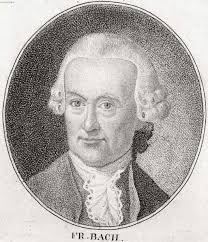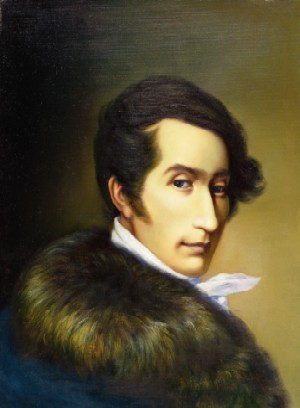November 17, 2014.This week across centuries.Wilhelm Friedemann, a talented but rather unhappy eldest son of Johann Sebastian Bach, was born on November 22nd of 1710.Friedemann had a difficult character, later in his life he drank heavily, but it seems that his main problem was his rivalry – probably unconscious – with his father.As Grove Music Dictionary puts it, “… [W.F.] Bach clearly concentrated more on virtuoso performance than on his career as a composer, perhaps in the depressing realization that he could never attain his father’s perfection in all musical genres. His creative energies were therefore expressed more readily in free improvisation, and particularly in his late years the improvisation of fantasies on the organ and harpsichord was very important to him.”Still, in that rather barren period of the 18th century between the deaths of J.S. Bach and Handel and the time when Haydn and Mozart brought the new classical style to its pinnacle, Wilhelm Friedemann was clearly one of the very best.To prove it, here’s his Harpsichord Concerto in F minor, written around1767.Claudio Astronio conducts the Italian ensemble Harmonices Mundi from the harpsichord.
Firdemann died in 1784.Two years later, on November 18th of 1786 Carl Maria von Weber was born in Eutin, the Duchy of Holstein.Weber is mostly known for his operas, especially Der Freischütz, considered the first German “Romantic” opera.The operas are indeed the most important part of his body of work, but being a wonderful pianist Weber also wrote a number of pieces for the instrument.He composed two piano concertos, four sonatas, and the Konzertstück (concert piece) in F minor for piano and orchestra.He completed the piece the morning of June 18th of 1821, the day Der Freischütz had its premier in Berlin.While the Konzertstück has just one movement (that’s why Weber decided not to call it a concerto), it has four sections and Weber provided a detailed – and highly romantic – program for each.The first one, according to the composer, describes a knight’s wife on a balcony, gazing into the distance, thinking about her husband who went on a Crusade to the Holy Land.In the second section, the excited wife, thinking of her possibly wounded husband, falls unconscious, but do we hear the trumpets in the distance?Yes we do, and in the third section, written in the gay C Major, the knights are returning from the Crusade to the delight of the crowds, and the couple is reunited.The forth, final episode depicts happiness without end.Felix Mendelssohn attended the premier, loved it and later played it many times.We don’t know whether Weber’s extravagant program helps the listener to appreciate the music but it’s a superb piece and is brilliantly played here by Alfred Brendel with the London Symphony Orchestra, Claudio Abbado conducting.
Weber suffered from tuberculosis and was just 39 when he died in 1826.Manuel de Falla, one of the most important Spanish composers of the early 20th century, was born fifty years later, on December 23rd of 1876 in the port city of Cádiz in Andalusia.Falla was the youngest of the three composers who revolutionized Spanish music at the end of the 19th century: Isaac Albéniz was born in 1860 and Enrique Granados – in 1867.While promoting the national roots of Spanish music, the three of them opened up a rather close-minded and xenophobic musical culture of the country to broader musical ideas, many of them emanating from France.Falla studied in Madrid as a young man, and then, in 1907, moved to Paris, where he met and befriended many composers, including Ravel, Debussy, and Stravinsky.Falla returned to Spain in 1914; by then he was recognized as one of the leading composers of the time.His opera La vida breve was successfully staged in France and Spain; he had a written a number of zarzuelas, songs, and chamber pieces.An even more productive period followed.One of the pieces Falla wrote shortly after returning from France was Nights in the Gardens of Spain for piano and orchestra, which he completed in 1915.Here it is, in the performance by the great champion of Spanish music, the late pianist Alicia de Larrocha; L'Orchestre de la Suisse Romande is conducted by Sergiu Comissiona.
Alfred Schnittke, one of the most important Russian composers of the second half of the 20th century, was also born this week, on November 24th of 1934.We commemorate his birthday every year and hope to do it in 2014 as well, albeit at a later date.
WF Bach, Weber, de Falla 2014
November 17, 2014. This week across centuries. Wilhelm Friedemann, a talented but rather unhappy eldest son of Johann Sebastian Bach, was born on November 22nd of 1710. Friedemann had a difficult character, later in his life he drank heavily, but it seems that his main problem was his rivalry – probably unconscious – with his father. As Grove Music Dictionary puts it, “… [W.F.] Bach clearly concentrated more on virtuoso performance than on his career as a composer, perhaps in the depressing realization that he could never attain his father’s perfection in all musical genres. His creative energies were therefore expressed more readily in free improvisation, and particularly in his late years the improvisation of fantasies on the organ and harpsichord was very important to him.” Still, in that rather barren period of the 18th century between the deaths of J.S. Bach and Handel and the time when Haydn and Mozart brought the new classical style to its pinnacle, Wilhelm Friedemann was clearly one of the very best. To prove it, here’s his Harpsichord Concerto in F minor, written around1767. Claudio Astronio conducts the Italian ensemble Harmonices Mundi from the harpsichord.
in his life he drank heavily, but it seems that his main problem was his rivalry – probably unconscious – with his father. As Grove Music Dictionary puts it, “… [W.F.] Bach clearly concentrated more on virtuoso performance than on his career as a composer, perhaps in the depressing realization that he could never attain his father’s perfection in all musical genres. His creative energies were therefore expressed more readily in free improvisation, and particularly in his late years the improvisation of fantasies on the organ and harpsichord was very important to him.” Still, in that rather barren period of the 18th century between the deaths of J.S. Bach and Handel and the time when Haydn and Mozart brought the new classical style to its pinnacle, Wilhelm Friedemann was clearly one of the very best. To prove it, here’s his Harpsichord Concerto in F minor, written around1767. Claudio Astronio conducts the Italian ensemble Harmonices Mundi from the harpsichord.
Firdemann died in 1784. Two years later, on November 18th of 1786 Carl Maria von Weber was born in Eutin, the Duchy of Holstein. Weber is mostly known for his operas, especially Der Freischütz, considered the first German “Romantic” opera. The operas are indeed the most important part of his body of work, but being a wonderful pianist Weber also wrote a number of pieces for the instrument. He composed two piano concertos, four sonatas, and the Konzertstück (concert piece) in F minor for piano and orchestra. He completed the piece the morning of June 18th of 1821, the day Der Freischütz had its premier in Berlin. While the Konzertstück has just one movement (that’s why Weber decided not to call it a concerto), it has four sections and Weber provided a detailed – and highly romantic – program for each. The first one, according to the composer, describes a knight’s wife on a balcony, gazing into the distance, thinking about her husband who went on a Crusade to the Holy Land. In the second section, the excited wife, thinking of her possibly wounded husband, falls unconscious, but do we hear the trumpets in the distance? Yes we do, and in the third section, written in the gay C Major, the knights are returning from the Crusade to the delight of the crowds, and the couple is reunited. The forth, final episode depicts happiness without end. Felix Mendelssohn attended the premier, loved it and later played it many times. We don’t know whether Weber’s extravagant program helps the listener to appreciate the music but it’s a superb piece and is brilliantly played here by Alfred Brendel with the London Symphony Orchestra, Claudio Abbado conducting.
the instrument. He composed two piano concertos, four sonatas, and the Konzertstück (concert piece) in F minor for piano and orchestra. He completed the piece the morning of June 18th of 1821, the day Der Freischütz had its premier in Berlin. While the Konzertstück has just one movement (that’s why Weber decided not to call it a concerto), it has four sections and Weber provided a detailed – and highly romantic – program for each. The first one, according to the composer, describes a knight’s wife on a balcony, gazing into the distance, thinking about her husband who went on a Crusade to the Holy Land. In the second section, the excited wife, thinking of her possibly wounded husband, falls unconscious, but do we hear the trumpets in the distance? Yes we do, and in the third section, written in the gay C Major, the knights are returning from the Crusade to the delight of the crowds, and the couple is reunited. The forth, final episode depicts happiness without end. Felix Mendelssohn attended the premier, loved it and later played it many times. We don’t know whether Weber’s extravagant program helps the listener to appreciate the music but it’s a superb piece and is brilliantly played here by Alfred Brendel with the London Symphony Orchestra, Claudio Abbado conducting.
Weber suffered from tuberculosis and was just 39 when he died in 1826. Manuel de Falla, one of the most important Spanish composers of the early 20th century, was born fifty years later, on December 23rd of 1876 in the port city of Cádiz in Andalusia. Falla was the youngest of the three composers who revolutionized Spanish music at the end of the 19th century: Isaac Albéniz was born in 1860 and Enrique Granados – in 1867. While promoting the national roots of Spanish music, the three of them opened up a rather close-minded and xenophobic musical culture of the country to broader musical ideas, many of them emanating from France. Falla studied in Madrid as a young man, and then, in 1907, moved to Paris, where he met and befriended many composers, including Ravel, Debussy, and Stravinsky. Falla returned to Spain in 1914; by then he was recognized as one of the leading composers of the time. His opera La vida breve was successfully staged in France and Spain; he had a written a number of zarzuelas, songs, and chamber pieces. An even more productive period followed. One of the pieces Falla wrote shortly after returning from France was Nights in the Gardens of Spain for piano and orchestra, which he completed in 1915. Here it is, in the performance by the great champion of Spanish music, the late pianist Alicia de Larrocha; L'Orchestre de la Suisse Romande is conducted by Sergiu Comissiona.
Alfred Schnittke, one of the most important Russian composers of the second half of the 20th century, was also born this week, on November 24th of 1934. We commemorate his birthday every year and hope to do it in 2014 as well, albeit at a later date.